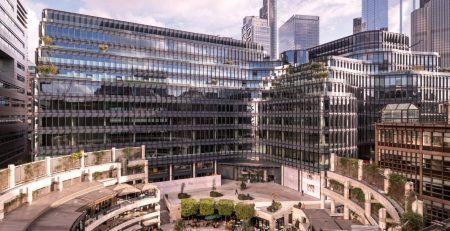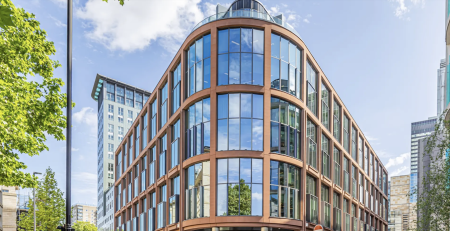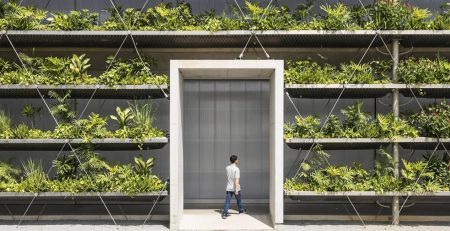What was The Buzz in February?
Our monthly roundup of real estate industry news.
Here are a few of the stories that caught our attention in February. From the approval of the city’s biggest retrofit, and some exciting new leases, to IWG’s report of record revenue, there’s no sign of slowing down in the commercial real estate industry.
City’s biggest retrofit tower scheme by Stanhope approved
Development manager Stanhope has got the go-ahead for a 33-storey office tower in London’s Square Mile.
The 70 Gracechurch Street project will provide 550,000 sq ft of office space and ranks as one of the city’s largest retrofit projects. The 155m tower will be stepped, with three glazed office elements split vertically.
Plans for a similar building on the site were first brought forward by Hong Kong developer Tenacity. These were approved in 2021, but the scheme failed to progress leading Stanhope to buy the site and form a partnership with Ontario Teachers’ Pension Plan to take the project forward.
Under the original plan, the existing 10-storey Marks and Spencer office building on the corner of Gracechurch Street and Fenchurch Street was to be completely demolished. Now much of the structure will be incorporated into the new building helping to reduce the carbon footprint.
To accommodate the increased height of the building, new tower columns will be threaded through the existing building frame and basement slabs to be supported on a new concrete raft. Where possible, new columns will be supported on existing column locations, with the existing structure being strengthened.
British Land lets 20,000 sq ft to generative AI company
British Land has leased 20,000 sq ft of workspace to generative AI media company Synthesia at its Regent’s Place campus. Synthesia will lease a bespoke space, designed in collaboration with British Land, at 20 Triton Street. The company will take occupation of its new London headquarters in the summer of 2025.
Regent’s Place is located in London’s growing Knowledge Quarter, close to a range of academic and research institutions including University College London, The Wellcome Trust and The Francis Crick Institute. The campus’s location within this well-established innovation ecosystem makes it well positioned to capture the growing space requirements from science and technology businesses.
Michael Wiseman, Head of Workspace Leasing and Science & Technology, at British Land said: “Synthesia is one of the UK’s most exciting home-grown technology companies, and is exactly the type of business we want to welcome to Regent’s Place.
“This latest letting reinforces Regent’s Place’s status as a centre of AI activity in London. Its location in the Knowledge Quarter, combined with our campus model, supports pathways to growth for science and tech businesses, allowing them to cluster and facilitating the serendipitous encounters that are so important for innovation.”
NewFlex signs for 32,000 sq ft at Bankside office scheme
Barings and joint venture partner and development manager LBS Properties have let 32,000 sq ft to flexible space provider NewFlex on a 15-year term at the TIDE development in London’s Bankside.
The NewFlex at TIDE space comprises parts of the lower ground and ground floors, and the entirety of the first and second floors.
NewFlex at TIDE will offer a range of amenities from meeting rooms to single-desk member workstations and self-contained private offices, along with a lower ground lounge, conference and meeting space that can accommodate more than 80 people.
Ian Mayhew, head of real estate equity asset management – Europe at Barings, said: “NewFlex is the ideal operator to launch NewFlex at TIDE with, which will create a sustainable and trusted workplace experience with both private and collaboration space, as well as regular and tailored wellness, social and professional events.
“From its sustainability credentials to its digital connectivity and design, TIDE is a truly best-in-class office development in central London that, particularly now with the addition of NewFlex at TIDE and its affordable spaces, is especially well-placed to be an incubator of thriving business.”
Nick Crawford, CEO of LBS Properties, added: “TIDE is a prime example of how environmental and social sustainability are integral to the future.
IWG’s Dixon ‘more confident in UK’ as it reports record revenue and centre openings
International Workplace Group PLC reported ‘record’ earnings for 2024, supported by demand for flexible workspaces, while maintaining a cautious outlook amid global uncertainty.
Landsec plans £2bn office sell-off to fund expansion into residential
Landsec has unveiled plans to scale back its investment in new office-led developments over the next five years in a bid to pivot its focus to the residential market.
In a capital markets update, the business outlined plans to reduce capital allocated to new office-led development starts by at least half over the next two to five years, once it has completed its current pipeline.
Development capacity will be shifted to residential-led projects “where returns are expected to be similar, but risk is lower”.
Over the same period, Landsec aims to sell £2bn of office-led assets to fund its expansion in residential.
The strategic shift by one of Britain’s best known commercial landlords follows a wider trend in the industry. Investors increasingly see less potential to make big returns from high profile office buildings and are attracted to the steady inflation-linked income from sectors such as housing.
The company could also look to buy existing blocks of flats to quickly achieve economies of scale. It currently owns only a few hundred residential units.












